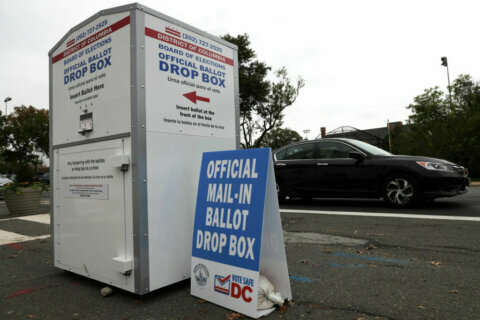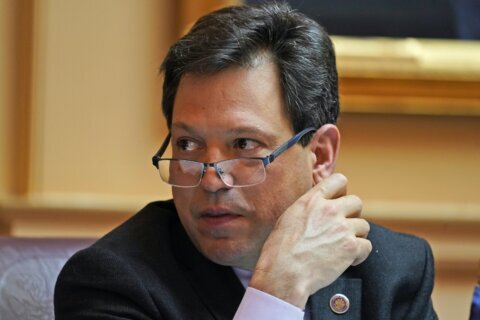This article was republished with permission from WTOP’s news partners at Maryland Matters. Sign up for Maryland Matters’ free email subscription today.
This content was republished with permission from WTOP’s news partners at Maryland Matters. Sign up for Maryland Matters’ free email subscription today.
Third parties in Maryland are feeling squeezed by a stay-at-home directive that’s canceling farmers markets and festivals ― and keeping Marylanders out of the joyous crowds where volunteers usually seek petition signatures to keep their access to Maryland ballots.
The Green Party and Libertarian Party ― as well as independent candidates, backers of charter amendments and other ballot question efforts ― have been petitioning the State Board of Elections for relief in recent weeks.
The board voted unanimously last week to temporarily allow the collection of electronic signatures, and there’s a willingness on the board’s part to extend the deadline for petitions later this summer by a week to help as well.
But advocates say the real challenge they face is meeting Maryland’s high bar for signature collection, something the state board doesn’t have the authority to change.
While the board can pass emergency regulations to deal with emergency issues, it generally cannot pass regulations that directly contradict state law, where signature requirements are defined.
Gov. Lawrence J. Hogan Jr. (R) has issued executive orders that allowed all state agencies to extend certain deadlines during the state of emergency caused by COVID-19. He also gave the State Board of Elections flexibility to change policies for the April 28 special congressional election and primary election in June.
But those orders do not grant the board to make changes relating to the general election.
Late Friday, Hogan spokesman Michael Ricci said given the state board’s decision to accept electronic signatures earlier in the week, “we don’t currently see a need to change the number of required signatures.”
The policy adopted by the state board on Wednesday will allow petition signers to download a form, fill it out electronically, serve as witness for their own signature, save the document and email it back to the petition gatherers.
Andy Ellis, co-chair of the Maryland Green Party, said the party has already experienced problems in the past with supportive voters incorrectly filling out downloadable petitions that had to be signed in ink. Removing the requirement for an ink signature is a step forward, but still requires a process that could be cumbersome to some voters and requires access to a personal computer, disenfranchising others, he said.
The electronic process also cannot replace the time the party lost in collecting signatures during the pandemic, Ellis said.
The Maryland Green Party has successfully petitioned to be on the ballot for every election since 2000 and had the plans and infrastructure in place to collect and turn in between 13,000 and 15,000 signatures in May or June. Those plans included using 25 volunteers ― who’d already been recruited ― to collect a total of 8,000 signatures in March, April and May.
The Maryland Libertarian Party has also appealed to the state board, suggesting that the signature requirement be cut to 30%, similar to executive action taken by New York Gov. Andrew Cuomo (D).
Libertarian Party Chairman Robert S. Johnston III said the party has regularly gained ballot access in Maryland since at least 1980 and could fail to meet the threshold this year solely as a result of social distancing directives.
“We legally are obligated to get these signatures and, at the same time, we legally are prohibited” from taking the usual steps to get them, Johnston said.
The party, as well as the Greens, are exploring legal options to move forward.
There has been litigation in other states. Earlier this month the Massachusetts Supreme Judicial Court ruled that signature requirements for primary races in that state should be cut in half and that deadlines should be extended.
In Illinois, a federal judge ruled last week that third-party candidates could gain ballot access by collecting 10% of the usual signature requirement. Both states also allowed for PDF signatures.
Ellis said voters in Baltimore City ― with the highest profile municipal elections this November ― will unfairly carry the brunt of the ballot access issue in 2020.
Owen S. Andrews, chair of the Baltimore City Green Party, said candidates are depending on party recognition to appear on the ballot in November. And the role of third-party candidates in state and national politics should not be discounted, he said.
“The global pandemic we’re in right now ― which is disproportionately affecting black people, people of color and, and working class people who don’t have access to health care ― highlights the need for a progressive party that has been calling for racial justice and comprehensive health care solutions, and prioritizing people’s needs and budgets over corporate interests,” Andrews said. “I think in this moment of crisis, people really are looking for alternatives. And not seeing them.”
The Baltimore City Green Party asked the state board to cut the total signatures from 10,000 to 2,000 for parties to appear on the ballot and from 10,000 to 500 for charter amendments. The letter was joined by several organizations in the city, including the Baltimore Transit Equity Coalition, which was supporting a ballot initiative to create a regional transportation authority in and around the city. Charter campaigns face extra difficulty in gaining ballot access this year because the pool of signers is geographically limited, advocates said.
Also in the city, independent mayoral candidate Kahan S. Dillon Jr. is seeking ballot access. He must collect signatures of 1% of the total registered voters eligible to cast a ballot for the office.
While prohibitions on mass gatherings and requirements to social distance are reasonable and necessary to protect public health, accommodations need to be made for ballot access, he wrote to the state board earlier this month.
“[T]hese are not normal times, the confluence of the signature requirement for petition candidates, the Stay at Home Order, and likelihood that restrictions on public gatherings will continue well into the summer make it impossible for an independent, non-party candidate such as myself to appear on the ballot in November, thereby depriving Baltimore City voters of the option of voting for someone not beholden to one of the two major political parties,” Dhillon wrote to the state board this month.
Jerome Segal, founder of the Bread and Roses socialist party in Maryland, will appear as the party’s presidential candidate on the November ballot here. He has voiced support for governors across the country lifting petition requirements that limit ballot access.
“Third parties are a critical part of our democracy,” Segal said in a statement. “They enrich our political and social discourse as a source of new policy ideas, and new perspectives on society and the world. We offer voters a chance to cast their ballots for a vision that may not be shared by the dominant parties.”
- Sign up for news alerts from WTOP
- Displaced Georgetown employees get a lifeline from BID, Halcyon amid the coronavirus crisis
- How one commercial real estate firm is envisioning the ‘6 Feet Office’
- DC, Maryland and Virginia see another 140K new unemployment claims
- Latest coronavirus test results in DC, Maryland and Virginia
- Coronavirus resources: Get and give help in DC, Maryland and Virginia







